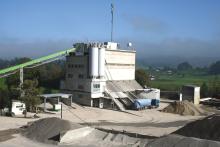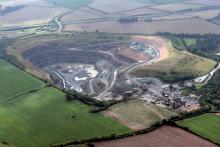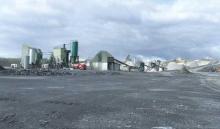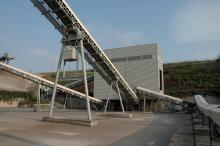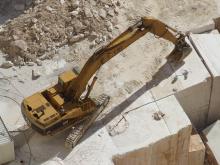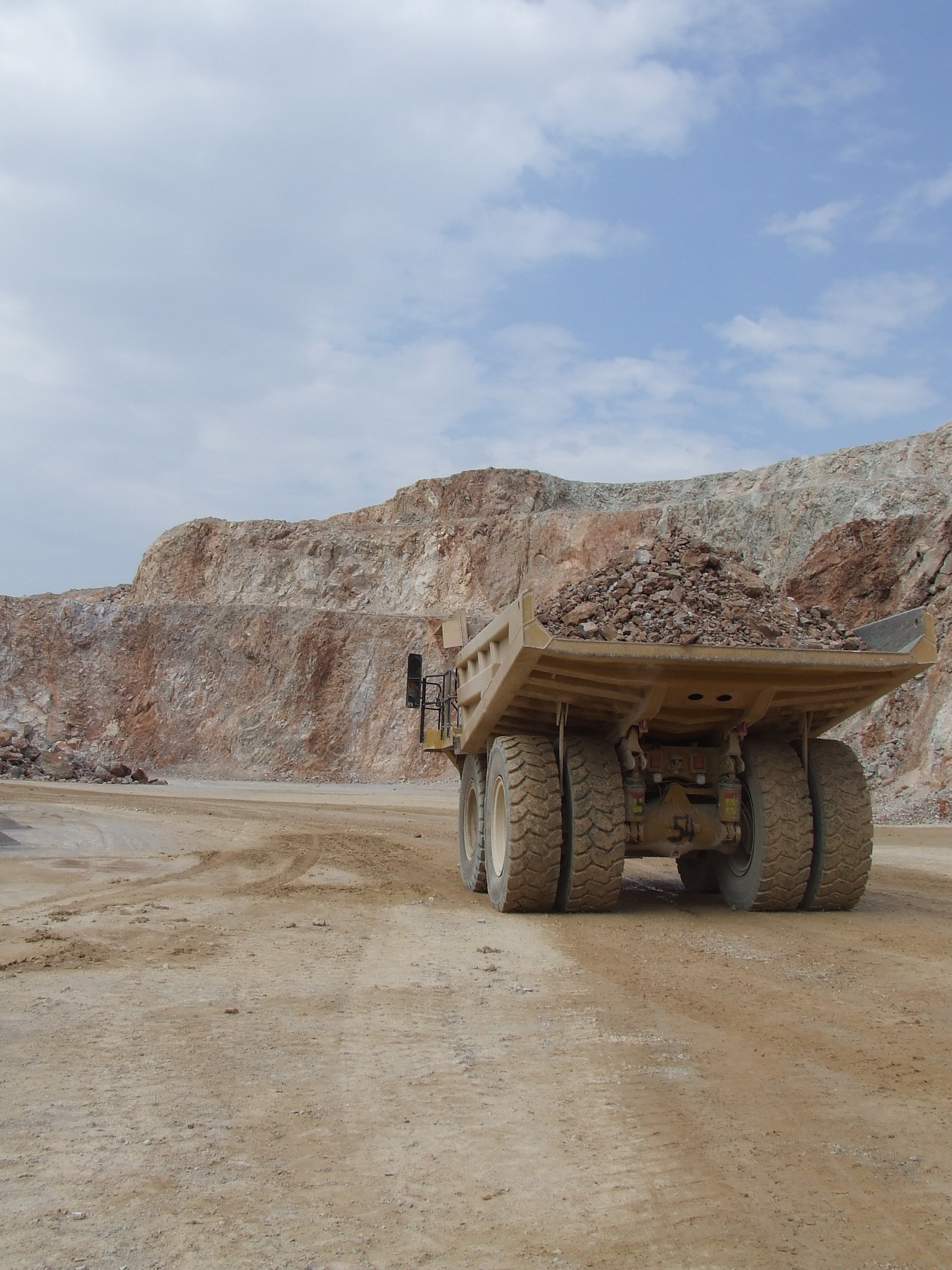
Theofilos Tsokanis started working in the construction materials business when he was just seven years old - 52 years on he has a thriving family quarrying business. Claire Symes spoke to him to find out more
Many people working in the aggregates sector have long careers in the business during which they have gained good insight into the industry. But few can have as many years under their belt at as young an age as Greek-born Theofilos Tsokanis.
Tsokanis will celebrate his 60th birthday next year, along with 53 years working in the construction materials business. He started by selling lime to construction sites from a wheel barrow aged just seven but today he has a multi million Euro aggregates and transportation company.
The scale of change in Tsokanis' business is underlined by the location of ABE's interview with him - it took place in the office at
Early starter
"I had to work as my family needed the money, so I delivered materials to the construction sites by day and went to school in the evening until I was 12," he said. "It was common at the time and my brothers also had their own jobs too. Our family was poor so we all had to contribute but the family supported me in what I was doing and also encouraged me." Tsokanis started by selling lime out of a wheelbarrow taking it from the builders merchants directly to the construction sites. While the first barrow Tsokanis used has long since fallen apart, he still has the second one - an item that has a position of pride within his business.
After Tsokanis left school, his business started to grow but he still wasn't old enough to drive a truck so he invested in a horse and cart to allow him to increase the volume of his deliveries. When he was 14, he officially started his company but changed the name to Vasiliki Tsokanis - his mother's name - when he was 18 and also bought a three wheeled delivery van.
"Not many people working in today's construction materials business have started this way," he said.
At 20, Tsokanis got a licence to drive a truck and started to deliver lime to more of the construction sites around Athens. During this period he did 27 months military service but, through gaining a local posting, he managed to continue to grow his business during this time.
Soon he bought a second truck and his younger brother - who had been working as a printer - joined the business. "When I was 23 I could see there was a future in aggregates and I got my other two brothers to come and work for me - one was working as a taxi driver and the other was also in the printing business. It only took one evening to convince them to join me - they were all keen to be part of it." Tsokanis' first venture into aggregates didn't involve owning his own quarry but delivering materials directly from the quarry to the construction sites, rather than from a builder's merchants. He worked with Halyps Quarry, taking around 4000 to 5000tonnes of aggregates per day from the site at a time when the quarry's output was around 10,000tonnes per day in the 1970s.
The quarry could not sustain the demand Tsokanis' business placed on production and he started to look for his own quarry. In the 1990s he bought one in Ermioni, 200km from Athens which produced crushed and screened limestone aggregates and still does today. The site currently produces around 1000tonnes per hour and operates between eight and 10 hours per day, depending on demand.
Around half the production was shipped to the Greek islands and this led Tsokanis to invest in his first boat.
Diversification
Today the company owns three quarries in Greece. As well as Ermioni, there is Nafplio located two hours' drive north of Athens and the recently acquired Kilkis quarry in northern Greece. He also owns another quarry in Izmir, Turkey.
"We currently produce around 2million tonnes of aggregates each year in Greece," he said.
But the company also manages a number of quarries for other companies - as well as Halyps Quarry, Tsokanis has recently started to manage a quarry in Albania for
Despite the global recession, Tsokanis still expanded his business last year by diversifying into road construction and lignite extraction. "Quarrying is important - it is my main business - but I am always looking for other opportunities as I want to buy new equipment and ensure it is being fully utilised," he said.
Until 2000, Tsokanis had always bought second hand machines but then he approached Cat's dealer in Greece Eltrak to look at the benefits to his business of investing in new machines. Tsokanis worked with Eltrak's sales manager Harry Merkouris on the initial proposal and the two still work closely together today.
Tsokanis invested in 40 new machines last year and replaces his equipment after five years - much sooner than most fleets in Greece where they are generally replaced after 10 years.
"Between May and December last year I invested around €35million in new machines and I like to find innovative ways to use them," he said. "I follow my instinct when it comes to investment." Tsokanis is unusual in the aggregates industry, according to Eltrak, with his demand for newer machines. Merkouris said that he has developed a good name in the market because of his focus on efficiencies, costs and also the environment.
Market demand
According to Tsokanis, there was a 50% reduction in aggregate demand last year in Greece compared to 2008 - Halyps was operating at 30,000tonnes per day but now is producing half of that figure. His won business in Greece also suffered - turnover in 2009 was €25million down from €40million in 2008. Tsokanis believes that it will take two to three years for demand to return to 2008 levels.
"There is always a reason for the crisis and something good will come out of it in the long term - it always has in the past," he said.
"During my career this has not been the only crisis and I have seen the benefits of investing during recession so that we are ready for the recovery before," he explained.
He said that he may not invest in more equipment this year but is already putting plans together for further expenditure in 2011 - both for machinery and quarries. "The current plan is to invest around €30million next year," he said.
Tsokanis has said that part of this investment will be used to equip new quarries he is developing in Thessaloniki and Lamia in Greece, which he hopes will be licensed for operation in 2011.
According to Tsokanis, licences to operate quarries in Greece are strict and difficult to obtain. "There is a lot of paperwork involved but it is not too much of an issue if you follow the guidelines," he said. Tsokanis insists on doing things correctly, even if other companies don't, so licences have not been too much of an issue for his business. "The environment is the future for my children," he said.
It is quite clear that Tsokanis enjoys the daily challenge of quarrying. Although he no longer has time to operate the machines on site, he does spend a lot of time visiting his quarries and ensuring work is being carried out to his high standards. When it comes to retirement, it is clear that Tsokanis is not ready to give up his control of the company, despite him having seven out of the nine children from his own and his brothers' families working in the business.
Nonetheless, Tsokanis has said that his nephew Charalambos Tsokanis will eventually take over the business. "I trust the next generation - they all have degrees and training that me and my brothers did not," he said.

